Pathways to homes for street children
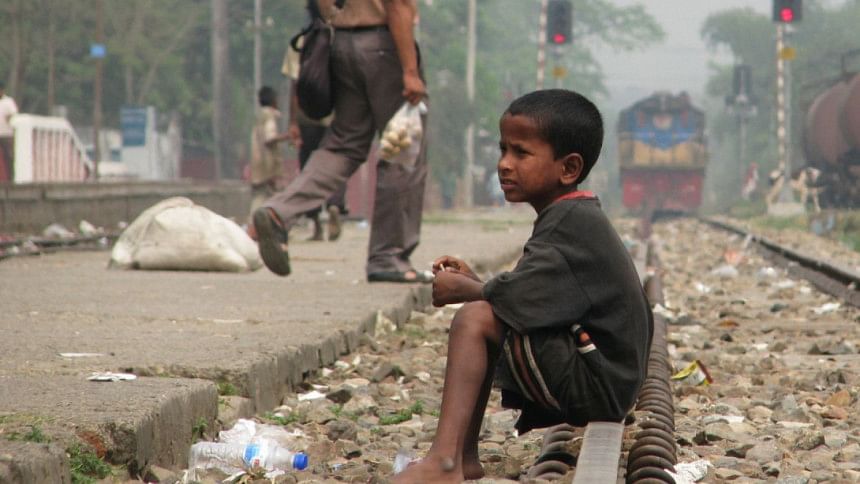
Homeless children in Bangladesh often face starvation, violence, social isolation, drug abuse, and poor health. A first-hand survey on street children conducted by the Bangladesh Bureau of Statistics (BBS), in collaboration with Unicef in 2022, found that over 34 lakh homeless children were without parental care. The study also found that 13.7 percent of street children in Bangladesh use drugs. Keeping children in the family before they become homeless is a critical element in preventing child homelessness. Providing institutional care is the next logical step; however, it is more expensive and does not provide some of the benefits that can be found in family settings.
We need to build a robust child welfare system to provide a range of services—from housing and healthcare to education—for at-risk and unhoused children. A hotline number or an online reporting system must be put up and an agency should be there to receive and investigate public reporting of child abuse or neglect. Children often become victims of their own parents when they suffer from beatings, torture, and verbal and mental abuse. The authorities must receive reports of any child facing hunger, abuse or violence. In Bangladesh, the women and children affairs ministry is most equipped to handle these reports and take swift actions to provide necessary services before the child is separated from the family.
Public sector employees must also be trained to conduct child protective investigation for non-emergency matters, such as the child's need for food, housing, education, etc., while law enforcement handles urgent issues such as crimes against the child. The efforts must be focused on facilitating children's stay with parents or a close relative to facilitate natural support, and the government must provide education and resources for the child to stay with the family. For vulnerable children, the authorities must take responsibility and parental rights should be terminated for abusive parents through proper court proceedings.
We must build a comprehensive dependency court system as the legal tool to oversee the child's overall needs and well-being. Two key personnel, guardian ad litem and attorney ad litem, are essential to ensure the child's best interest in civil and legal matters. While the guardian ad litem should oversee the best interest of the child, the attorney ad litem will provide legal representation to protect those interests. The child must be involved in the decision-making process unless he or she is incapable of doing so.
Local child-placing or adoption agencies must be established to provide adoptive and post-adoptive services. Non-profit and community-based organisations have proven to work best for a child under care. They can arrange a range of adoption services such as safe homes, shelters, food, education, protection against violence, and even vocational training to assist the child to live independently when they become legal adults.
Stringent laws should be passed to prevent sexual exploitation and forced labour. The government must provide financial and technical assistance to the family willing to adopt a child as appropriate.
We must re-engineer our existing institutions to provide out-of-home foster care. For this, the government can collaborate with community-based adoption organisations that have the right skills and resources to provide necessary services to the children when their families or relatives cannot provide care. The US has numerous child-placing agencies to provide various adoption services for dependent children and youths across the nation. The foster care coordination provided by these agencies often continues till the age of 23, depending on the individual state, upon meeting local criteria. These agencies show remarkable efficiency in providing physical, behavioural, and mental health services, as well as education and job training to prepare children to live independently. The agencies simultaneously coordinate with parents or relatives to facilitate reunions.
Bangladesh's juvenile justice system should be enhanced to deliver rehabilitative services for youths involved with crimes. Comprehensive rehabilitation programmes should be there to help children restart their lives in their community when released from prison. Most adolescents end up in jail due to behavioural, mental health or drug issues. The juvenile justice system must prioritise inmates' behavioural and mental health, addiction treatment, and provision of life-sustaining resources to help them rebuild their lives and reduce recidivism once they are out of incarceration.
Lastly, we must establish comprehensive social and financial programmes to eradicate child poverty. Children living in poverty often face violence, neglect and abandonment. The government must create a data-driven holistic demographic research system to prioritise underlying conditions that affect child health and well-being.
Every child deserves to achieve permanency. Authorities in Bangladesh must investigate child homelessness from a systematic lens and build a comprehensive data-driven welfare system to provide shelters and homes for street children.
ABM Uddin is a senate analyst for the Florida Legislature.
Views expressed in this article are the author's own.
Follow The Daily Star Opinion on Facebook for the latest opinions, commentaries and analyses by experts and professionals. To contribute your article or letter to The Daily Star Opinion, see our guidelines for submission.

 For all latest news, follow The Daily Star's Google News channel.
For all latest news, follow The Daily Star's Google News channel. 
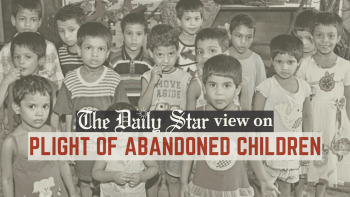
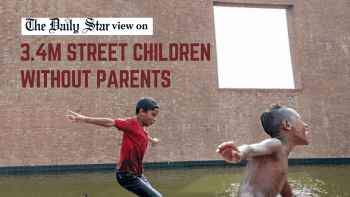




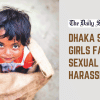

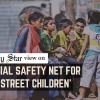

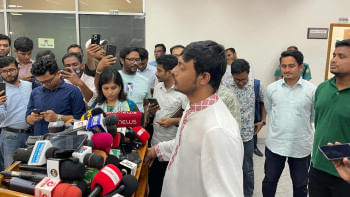
Comments